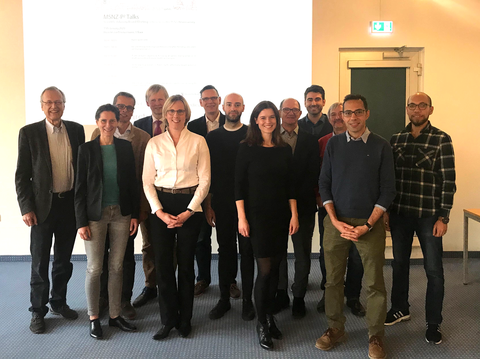Jan 16, 2020
Strengthening the new generation of clinical researchers is the key to developing tomorrow's therapies

On the occasion of the meeting of the Scientific Advisory Board on 15.01.2020 the MSNZ fellows presented their research projects. Presented here are the members of the Scientific Committee, the Scientific Advisory Board and the MSNZ fellows
Just 30 years ago, a cancer diagnosis meant a death sentence in most cases. Only intensive, clinically-oriented research has made it possible to develop targeted therapies that significantly improve the chances of cure today. This means half of all cancer patients can be cured nowadays. However, this is not a point to rest on. Consistent research into clinical issues is the prerequisite for sustainable and patient-oriented care.
But the ones who realize this particular research are missing. Fewer physicians are opting for a combination of clinic and research. The reasons for this are manifold. The balancing act between the best possible medical and at the same time scientific training is often too big. In addition, clear career perspectives and research-friendly working conditions are lacking for the so-called "Clinician Scientist". However, this problem does not go unnoticed and funding bodies such as the DFG, BMBF and foundations are increasingly reacting with funding programmes.
So does the German Cancer Aid. With its program on the "Mildred Scheel Early Career Centres", 10 million euros are provided over a period of five years to support the establishment of clinical research groups in five German oncological centres. Since the beginning of 2019, this has also included the Medical Faculty of the TU Dresden. With the concept "P²- Personalized Career Planning in Precision Oncology", physicians and basic scientists are supported by funding their own junior research group. "We want to create a plannable scientific career in university medicine for our researching physicians and at the same time give basic scientists a deeper insight into everyday clinical practice," says Prof. Martin Bornhäuser, Clinical Director of Medical Clinic 1 and speaker of the program. In addition to financial support, the fellows also receive scientific and administrative support. An accompanying mentoring program enables the early career scientists to benefit from the expertise of experienced peers from bedside and bench. Another important aspect of the program is the teamwork between the mentioned professional groups.
And it works! "We were able to achieve many of our objectives in the first year," says Prof. Martin Bornhäuser. For example, the first four research groups are investigating for example the cancer metabolism, reproduce mini-tumors in culture, characterize immune cell populations in cancer patients, and use immune cells for oncological therapy. Individual solutions have been found for each of the fellows. One example is the team led by Sebastian Garcia, MD, who, together with molecular biologist Dr. Jovan Mircetic, conducts research into therapeutic options for aggressive gastric carcinomas. A truly translational approach, because the assistant doctor is now able to examine patient samples obtained during surgery using the latest scientific methods.
And there' s a lot more to go for. The recruitment of new research group leaders is going on in 2020. "We are looking forward to translational and interdisciplinary projects that will be integrated allover the institutes and clinics of the biomedical campus of the TU Dresden," says Frank Buchholz, Professor of Medical Systems Biology and also speaker of the MSNZ. Further many networking opportunities are planned. At retreats, summer schools and Meetups, physicians and scientists will find suitable platforms to get contact. "Know-how and everyday expertise has to be communicated. The best way to do this is by personal exchange," says Martin Bornhäuser. In the long run, the formed infrastructures should be integrated into the campus and supported by the university.
